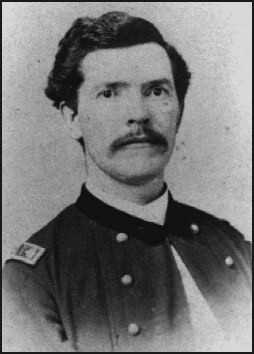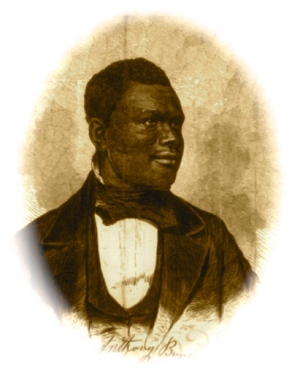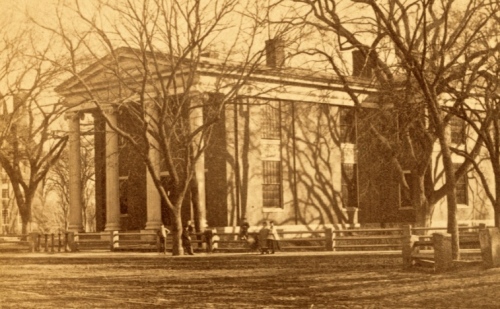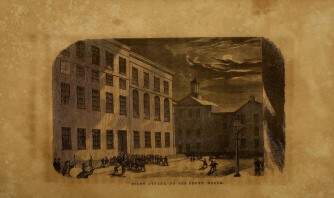1854: Josiah Burnham Kinsman to Family

This letter was written by Josiah “Burnham” Kinsman (1824-1912), the son of Joseph and Eliza (Page) Kinsman of Cornville, Somerset Co., Me. He was educated to the law, and after a preparatory course at the North Yarmouth Classical Institute, went to Cambridge, and received his degree at Harvard University in 1854. After graduation, he entered Benjamin. F. Butler’s law office in Boston, and was admitted to the bar, but remained several years at Cambridge, engaged in editing law works, besides publishing one of his own on “Municipal Law and the Rights and Duties of Municipal Officers”; went into a successful practice in Boston, and continued it until the Civil War whereupon he entered the service as a volunteer Aide-de-Camp on the staff of General Butler, without commission or pay; and served in that capacity at Fortress Monroe, Ship Island, and New Orleans, as First Lieutenant, but without pay or rank, until, for meritorious services at the taking of Forts Jackson and St. Philip, President Lincoln, unsolicited, commissioned him a Lieut.-Colonel in the Regular Army. For his successful expedition and capture of the city of Thibodeauxville, in southwestern Louisiana, and the rescue of its Union citizens; his expedition from New Orleans to Mississippi, and capture of the noted Rebel steamer “Gray Cloud,” afterward renamed the “Kinsman“; also for his discovery and capture of $800,000 in silver from the enemy, he was promoted to be Colonel, Brigadier-General, and Major-General of Volunteers. Was Provost Judge at New Orleans, and also filled the laborious and responsible position of Commissioner of Sequestration of Rebel estates and property. After leaving New Orleans he was actively engaged in other service, and since the War has been employed by Government in different capacities at home and abroad.

A considerable portion of this letter is devoted to the trial in Boston of Anthony Burns, a fugitive slave from Virginia. “Hired out in Richmond, Burns had saved money and stowed away on a ship to Boston, where he worked in a clothing store. A letter home to his brother unintentionally revealed his location, and when it was intercepted, Burns’s owner, Charles F. Suttle, traveled north and claimed Burns under the Fugitive Slave Act of 1850. Approved as part of the Compromise of 1850, the law was designed to strengthen federal protections for southerners attempting recover slaves who had fled to free states. Members of the Boston Vigilance Committee, a group of antislavery activists who were committed to resisting the law, made an attempt to free Burns from custody. The rescue effort was unsuccessful, and a guard was killed in the process. In the trial, Burns’s lawyers argued that the Fugitive Slave Act was unconstitutional and that Burns was not actually the man whom Suttle claimed to own. On June 1, 1854, Judge Edward Greely Loring ruled against Burns, who was afterward transported to Norfolk, Virginia, on a U.S. Revenue Cutter. Antislavery activists later purchased his freedom, and he became a minister, dying in Canada in 1862. None of those responsible for the guard’s death was convicted, and many southerners believed that, in spite of the Fugitive Slave Act’s successful enforcement, the Burns affair proved that northerners could not be trusted to fulfill their constitutional obligations.” [Source: Encyclopedia Virginia]

TRANSCRIPTION
Dane Hall
[Cambridge, Massachusetts]
Wednesday PM [1 June 1854]
Dear Frank,
Your kind letter so long looked for I received this day and promise you it will not wait for a day to pass before an answer is on its way to find you.
You complain of my silence. Almost as soon as I arrived here I wrote to Luther and what was the result? Not one word till today have I heard from any living being from home since I came away and scarcely has there a day passed that I have not been to the [Post] Office in the forenoon and afternoon with the same story of nothing for you. Now who is to blame? Should I have written again telling you that you had not written? That you already knew. Should I have said I had received your letters? That would have been untrue as you would know you had sent none. Then what had I to write? Why simply nothing but to wait patiently or impatiently as the case may be till some such time as your mind should be disengaged from things of more importance and that some [ ] in the house or some tree in your yard remind you that I had been there or as my last thought was that some old neighbor inquire for Burnham whose mind was not so much occupied that they remembered me and might remind you I still was somewhat not with you. I always answer your letters immediately if I have no reason why I cannot.
Now does it look as though I am thought of often at home very often. And yet you say it is my desire to keep silent. But I am pleased to hear that you received my letter the very week I left home. Yes [ ] that home has become a thing of minor importance to me but myself of minor importance at home.

We are having a very great excitement in Boston and have had since last Friday [26 May 1854]. I was in to Faneuil [Hall] on Friday evening at the fugitive slave meeting ¹ and such a fever heat I have never seen in a meeting before and then went to the mob at court square and in the crowd and press. It was hard to tell oneself from the next man. The windows were smashed with stones and brick from a pile that lay on the opposite side of the street and a long timber was brought for a battering ram when the door of the court house was broken in and a fight from outside and in ensued and a man on the inside who volunteered to watch the negro was killed and several arrests were made with one law student from Salem among the rest by the name of Albert E. Browne.
I went on Monday [29 May 1854] to hear the trial as Prof[essor Edward Greely] Loring of the Law School is the Commissioner and with a pass from the U. S. Marshal, I was more than hour before I could get into the court room and then it was by the assistance of the Deputy Marshal squeezed up between files of soldiers that filled any passageway to the door. U.S. troops (are quartered in the public buildings) from Charleston, Fort Independence, and Portsmouth, N. H., and Boston. It looks as though it is under a state of siege. What is to be the result, I cannot tell. The decision is to be made on Friday. The progress of the trial you shall hear by mail.
Wednesday I received a note from Uncle Hiat [?] saying he was at the Quincy House, Boston, with his daughter and should leave that afternoon for Maine and wished me to come over and take Miss Conklin after dinner si die or spirit see them about an hour. Then they started for Portland. Could not prevail on Uncle to stop and come to Cambridge. Said he should come in the fall. Mrs. Woodbridge would have stayed but he said no. To Maine they would go and go he went. I think you would like her much. She says she knows you well. She stops a week or so in Portland with her aunts before she goes to Cornville [Maine].
I have a room in Dane Hall and if anyone is coming that you could send me some bed clothes for the top of a bed, I should like it. Such as a change of sheets and a spread but I can get along without it if it is not convenient for I have a bedroom that is small at Mrs. Conklin’s but this is a high, airy room here that Judge Loring occupied and he has one on the other side of the hall now. Prof[essor Theophilus] Parsons let me have this so I am lucky in getting it and if I could get the bed cloths, it would be better for me to sleep here than in a small room.
Has our folks sold my hay or not? for I am most out of pants. My last ones are worn to hools [?] and I shall have to get a pair of pants and coat before I take my degree somehow but I don’t know where they are to come from.
Mrs. Conklin says she will pay you for scratching her so in your letter when she sees you for she had to wait as long or longer when she wrote to you. Is Charles or any of our people coming here this summer? If so, when and who?
Matty has been here all of the time till today. She goes home in the express train this evening and says she would like to see you very much. Give my love to all and keep a large share for yourself.
Truly your brother, J. B. Kinsman
Cambridge
June 1st 1854
¹ The rousing speech delivered by Rev. Theodore Parker at the Faneuil Hall fugitive slave meeting on Friday night, 26 May 1854 resulted in some of the attendees to storm the court house and demand he release of Anthony Burns.
Griff View All →
My passion is studying American history leading up to & including the Civil War. I particularly enjoy reading, transcribing & researching primary sources such as letters and diaries.





The officer posted as Josiah Burnham Kinsman is really Dennis Thomas Kirby, both brevet generals.
LikeLike